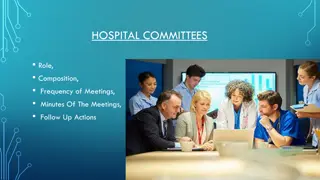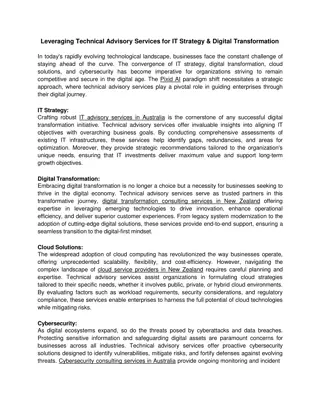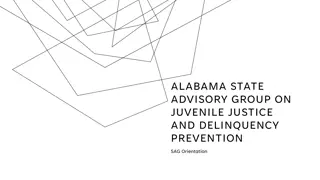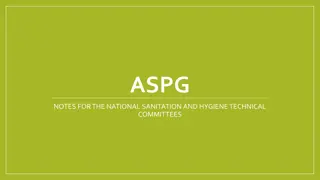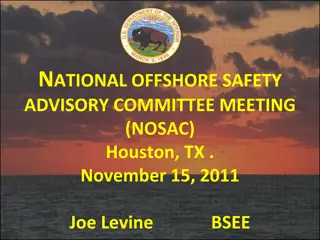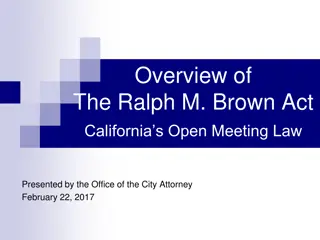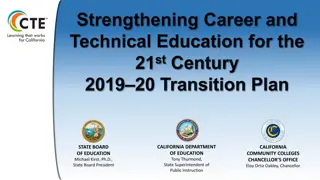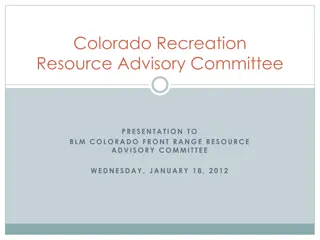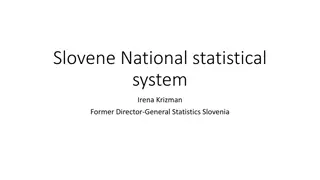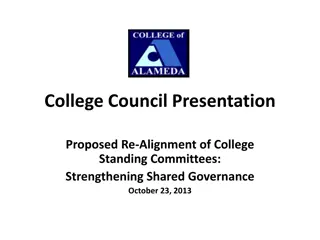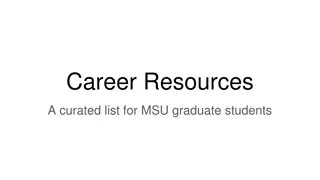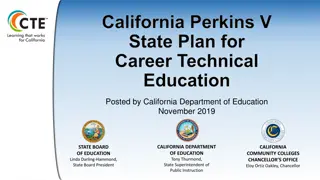State-funded Career & Technical Program Advisory Committees
This content highlights the role and requirements of Advisory Committees for state-funded career and technical programs. It explains the purpose, responsibilities, election process, committee size recommendations, meeting schedules, and attendance criteria. The focus is on maintaining the integrity and effectiveness of these committees in supporting program quality and community engagement.
Download Presentation

Please find below an Image/Link to download the presentation.
The content on the website is provided AS IS for your information and personal use only. It may not be sold, licensed, or shared on other websites without obtaining consent from the author.If you encounter any issues during the download, it is possible that the publisher has removed the file from their server.
You are allowed to download the files provided on this website for personal or commercial use, subject to the condition that they are used lawfully. All files are the property of their respective owners.
The content on the website is provided AS IS for your information and personal use only. It may not be sold, licensed, or shared on other websites without obtaining consent from the author.
E N D
Presentation Transcript
Every state funded career and technical program is required to have an active Advisory Committee. Committees Provide Program quality assessment Unique training/educational experiences Validation of content Career guidance/student placement Community promotion of programs Community, business, industry resources
The focus and intent of this law is to ensure that Advisory Committee members, college administrators or instructors are not the recipients of any personal or financial gain or private advantage; Through their role on the committee By fulfilling responsibilities of their positions From the actions or votes of the Advisory Committee, or Through the efforts or outcomes of the program or the college.
Officers for Advisory Committees are a Chairperson and a Vice Chairperson. Officers term is 2 years and may be re-elected. Election of officers is done by nomination and a vote by the committee. Elections are generally held at the last meeting of the academic year. This allows experienced members to lead and plan the agendas for the new academic year. Faculty or other college administrators and staff cannot serve as officers. Committees follow Roberts Rules of Order and are run by the elected Chairperson. Meeting coordination, minutes and state record regulations are managed by the Clark College Advisory Committee Coordinator.
Effective advisory committees should be large enough to reflect the diversity of the community, yet small enough to operate effectively. Committee size can vary based upon; The size and scope of the professional or technical program Diversity of businesses and industries in the community Purpose of the committee The State Board of Community & Technical Colleges recommends a minimum of five committee members. Eight to fifteen members is most typical and committees with more than sixteen members can become unmanageable.
Schedules: according to their availability and that of the college to support the meeting time. Schedules: Meetings are scheduled by the committee members Attendance: reliant on attendance. -RSVP s and attendance communications show respect for the other members and their time. -Members not attending at least 50% of the scheduled meetings should be replaced in order to maintain a viable committee. Attendance: The ability of the Advisory Committee to function is Location to provide adequate space, technology and public access. Location of meetings: Typically held on the Clark College campus Frequency meetings be held each year. Frequency of meetings: The State requires that a minimum of two
Committee membership is reviewed and updated annually. Broad-based representation of the industry is optimal. As required by the state, committees must maintain a fifty percent employee and fifty percent employer balance. Three-year terms of service most typically provide needed rotation. Advisory Committee members are encouraged to invite professionals interested in serving to meetings.
Vision Interest Availability Character Leadership Skills/Experience Advisory committee members should be; Knowledgeable about the target occupations. Have significant work experience in the technical or professional field. Able to demonstrate good communication and administrative skills. Members are typically recruited through business or organizational associations, professional affiliations and local community networks.
The leadership of the Advisory Committee is key to the committee s success. The chairperson plays a critical role in this success by maximizing the effectiveness of the committee. By including everyone, asking members to bring new best practices, or to share professional perspectives are all fundamental supports for building dynamic, responsive program outcomes and successful students! and successful students! The Chairperson runs an effective, timely and active meeting. Coordinating with the faculty lead to set the agenda, the Chairperson moves the decision making forward, generates energy and sustains interest.
Set meeting agendas in collaboration with program director and/or lead faculty member or designee. Preside at meetings Arrange the committee s work to keep it focused Delegate tasks and follow-up on work Arrange for information and reports to be presented Appoint standing committees and subcommittees Represent the committee at official meetings and functions Submit written committee recommendations to college administration Follow-up on committee recommendations and actions
In the absence of the Chairperson, preside at committee meeting in the role of Chairperson. Play a role in assisting the Chair to keep meetings focused and on time. Assist the Advisory Members in achieving their goals and the goals of the committee. Provide professional and/or other technical support to the committee.
Advisory Committees have effective bylaws that establish the operating guidelines for the committee. Bylaws are reviewed as needed and ensure the committee operates efficiently and transparently. At a minimum, these documents include: Committee operations Member responsibilities Election of officers Program of work (Work Plan) Quorum requirements
A quorum is the minimum number of votes needed to pass a motion for ratifying or finalizing a decision. The quorum for each advisory committee is outlined in the bylaws. In the absence of a formal policy, a quorum should be defined as a simple majority of voting members (51% is generally acceptable).
Only Only the members Committee can vote. the members of the Committee can vote. of the Advisory Advisory Advisory committee members who serve as adjunct faculty for the college cannot vote. Other college personnel and students are non-voting members. In the event a motion is made where there may be a conflict of interest: The individual is expected to recuse themselves. If a conflict of interest on the part of a committee member is perceived by the Chairperson or program Dean they will ask that the member recuse themselves from the vote.
Design Develop Implement Evaluate Innovate Respond Maintain Quality & Grow! Committee members and Clark College faculty work together to determine how to meet the training and education requirements needed for the professional field. Matching those to business needs and ensuring student success requires a work plan. Together they: Establish annual goals Plan committee activities Assign responsibilities Establish timelines
Priorities Include 1. Curriculum and technical skill assessments 2. Facilities, equipment and resources 3. Staff development 4. Career development and work-based learning 5. Marketing and program advocacy 6. Student recruitment, mentoring and placement 7. Program innovations, new practice 8. Evaluation of the program 9. Improvements to meet industry needs
Annual Training Advisory Committee Chair and Vice Chair are invited. Held at the Main Campus, the three hour event includes a meal and training materials. Annual Training held in the fall. Annual Recognition All committee members, lead faculty and Deans are invited. Held at the Main Campus, the two hour event includes a meal and presentations. Annual Recognition event held in the spring.
Please take time to explore the Clark College website for additional information. Maps of campus locations http://www.clark.edu/clark-and- community/visitors-guide/getting-to-clark/index.php The Clark College course catalog http://www.clark.edu/academics/catalog/archive.php The Clark College Strategic Plan http://www.clark.edu/clark-and- community/about/strategic_plan/index.php
An advisory committee website has been set up to provide you access to meeting agendas, minutes, bylaws, work plans and the Advisory Committee Handbook. The link is: The link is: Advisory Committee Website Advisory Committee Website Please Please take a few minutes now to go to the advisory committee website and look at its features. take a few minutes now to go to the advisory committee website and look at its features. To access to your committee roster, contact Andreana DiGiorgio at adigiorgio@clark.edu.
Contact: Andreana DiGiorgio Office of Instruction - Secretary Senior adigiorgio@clark.edu (360) 992-2322 Andreana DiGiorgio Cathy Sherick Associate Director Instructional Programming & Innovation csherick@clark.edu (360) 992-2409 Cathy Sherick Rachele Bakic Interim Director of Academic Services rbakic@clark.edu (360) 992-2621 Rachele Bakic



